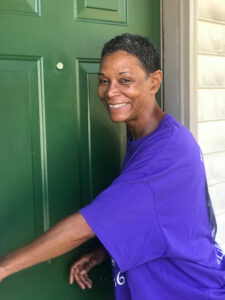 When Pamela’s mom got sick, her world fell apart. “She was my best friend,” Pamela says. Her mother battled cancer for over two years. Pamela left her full time job and moved to North Carolina to care of her. “When she died,” Pamela says, “I didn’t realize how much that impacted me. I was sick and didn’t even know it,” she says. “During a dark time, you make bad decisions. The first thing that happens is you start to isolate yourself. I was spiraling down.”
When Pamela’s mom got sick, her world fell apart. “She was my best friend,” Pamela says. Her mother battled cancer for over two years. Pamela left her full time job and moved to North Carolina to care of her. “When she died,” Pamela says, “I didn’t realize how much that impacted me. I was sick and didn’t even know it,” she says. “During a dark time, you make bad decisions. The first thing that happens is you start to isolate yourself. I was spiraling down.”
After a protracted battle with her mother’s life insurance company, Pamela made the inexplicable decision to walk into a bank and demand money. “I didn’t know I was doing it,” she says. “I had money in the bank. It didn’t make any sense. I didn’t have a gun, I was crying and upset because I had been dealing with this lawsuit for years.” A frightened teller gave her the money she demanded, and Pamela walked out with it. Police appeared at her home hours later and arrested her for robbing the bank. She was incarcerated for 46 days until she appeared before a judge, who sent her to the hospital. During the ordeal, she missed several mortgage payments and lost her home. When she was discharged, Pamela was homeless with a criminal record.
“Once I was homeless, it got more and more out of control,” she says. “I realized I had a mental disease and that’s how I ended up where I was, but I didn’t know how to get out. So I stayed homeless. I slept in tents, I slept on benches, I slept on cardboard. You can’t get well living out in the streets.”
Eventually, Pamela wandered into a clinic where a service provider explained the connection between health and housing. “They told me, ‘You’re sick because you can’t take care of yourself being homeless. You’re not going to get well until you get in the right place.’” Her therapist mentioned CASA, which led Pamela to meet a leasing specialist who helped her with her voucher and her application. She was approved for an apartment weeks later. Pam had been homeless for three years.
She remembers the day she signed her lease with tears falling down her face. “CASA gave me an address! An address! For the first time in three years I don’t have to worry. These tears here, these are tears of joy,” she explains. “Y’all brought me in. No one else would accept me. When I took my key and opened that door, it was so overwhelming. Without CASA I might have lost that voucher and I didn’t know how to look for housing.”
“All I’m doing is right now is healing,” Pamela says. “People cannot get well unless they live in a safe and secure environment. This place – my home – is healing me. I take my pills every day. I eat right every day. I don’t have to worry about how I’m going to eat tonight and if I’m going to have to steal a sandwich. I just go to my refrigerator. CASA did something that I didn’t think could ever be done. To me, it’s a miracle.”


